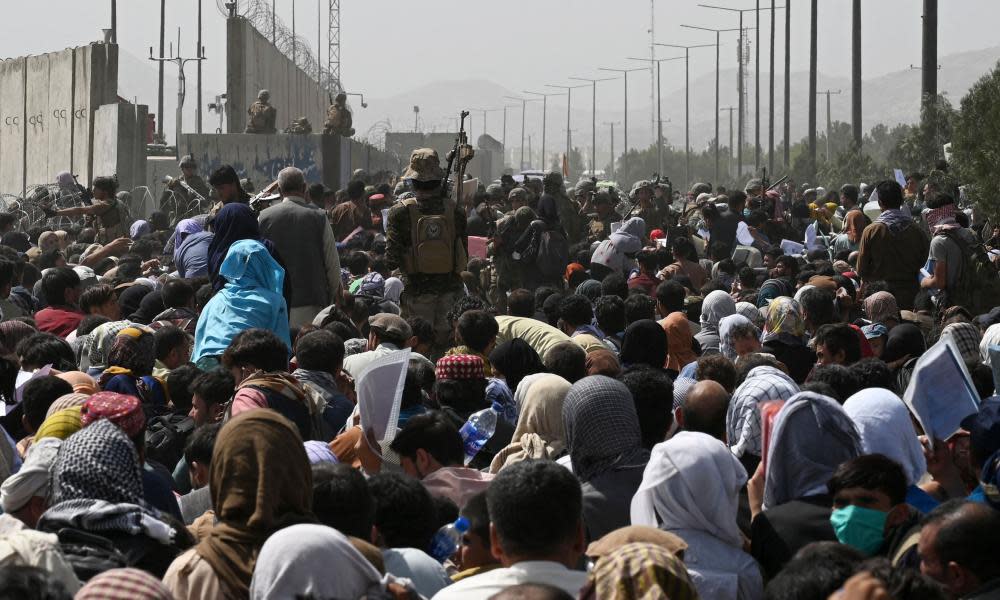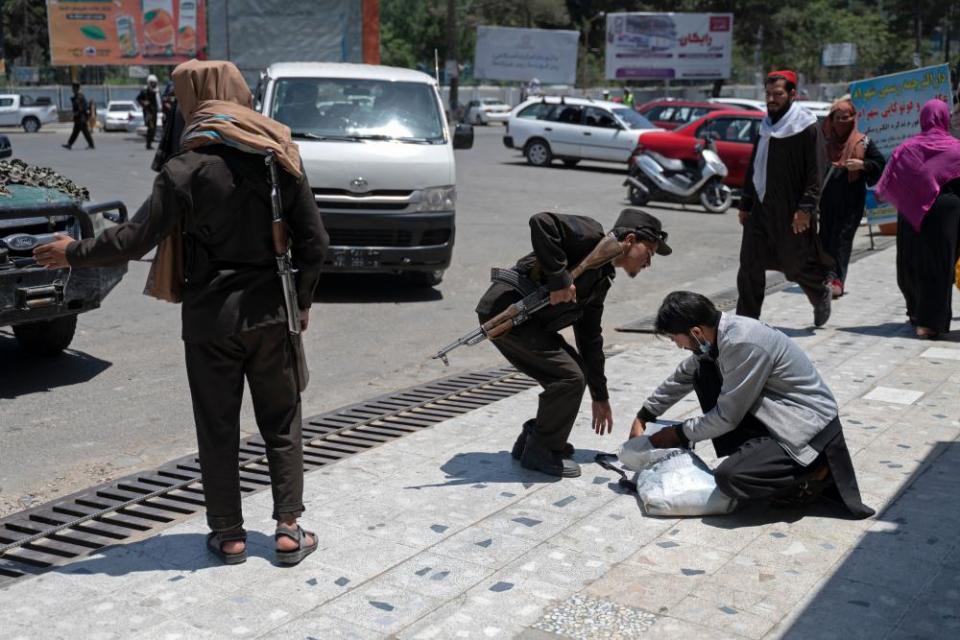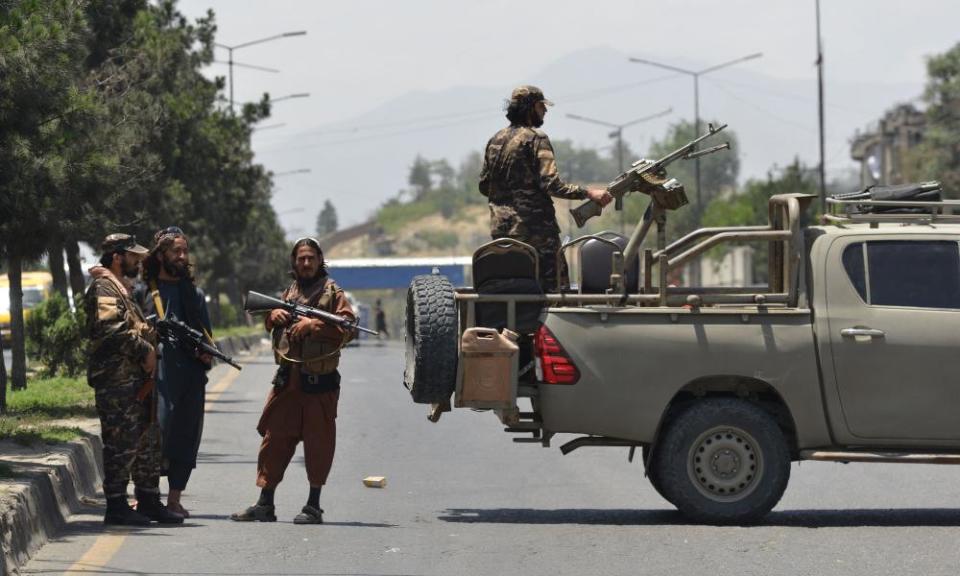‘Every day I am fearful’: Afghans with Australian visas wait in limbo a year after the fall of Kabul

Sayed* cannot forget the chaos of his final hours at Kabul airport – the surging masses of people trying to board any flight they could, his own desperate, unsuccessful pleading to board an Australian flight – showing the 449 visa he’d been hastily granted to enter the country.
A year later, still clinging to that 449 visa, he is yet to find a way to Australia. He is stranded in a refugee camp in the Netherlands, his family remain in hiding in Afghanistan, fearful of the Taliban insurgents hunting him.
He is one of hundreds of Afghan nationals bearing visas for Australia for whom the harried escape from a collapsing republican Afghanistan has descended into a grinding, uncertain wait to find a way, finally, to Australia.
Many are stranded in the neighbouring countries of Pakistan and Iran, semi-legal and fearful, eking out a penurious existence on the margins. Waiting.
But the number of Afghans seeking to come to Australia far outstrips the humanitarian places. The government has pleaded for “patience”, and for people to remain safe.
‘We relied on each other’
The Taliban came, Sayed says, with astonishing swiftness.
The night the Taliban swept into Kandahar, violently retaking control of the city they regard as their spiritual home, Sayed was just minutes ahead of them.
As rumours spread that the Taliban were resurgent and would ultimately win the months-long battle for the city, Sayed scrambled aboard a bus to Kabul, Afghanistan’s capital and the city supposedly most impregnable to the Taliban’s sweep north.
Related: A year since fleeing Kabul: ‘Now my children can grow up in peace’
It would prove to be false hope. Within days, Kabul would also fall.
On the journey north, Sayed carried with him items that were deeply compromising: the “night letters” left by the Taliban warning he would be killed for his work on behalf of the foreign “infidels”; his identity papers; and documents detailing his service for the Australian military.
These were vital for securing whatever sort of future he could, but also potentially incriminating. They were, Sayed says, a risk worth taking.
Sayed had spent three years – between 2010 and 2013 – working alongside Australian troops, an interpreter on their frontlines, serving on combat missions in the dust of Uruzgan, before a decade serving the broader coalition mission, working at Kandahar’s sprawling military airfield.
He carries the certificates of appreciation, signed by his commanders, lauding his “first-rate skills”, and describing him as “an example for your fellow countrymen”.
A letter of recommendation, signed by Sayed’s Australian warrant officer, reads: “Should Sayed ever have reason to seek assistance from an Australian Embassy or Consulate I would ask that every kindness and courtesy be extended to him and ask that Embassy and consulate staff remain mindful of the dangers, hardships and sacrifices that Sayed has endured due to the nature of his relationship with Australian service personnel.”

Sayed remembers his time alongside Australians fondly. “It was good work, but it was very risky. It was very dangerous being a civilian next to people in military uniforms, working on combat missions.
“We relied on each other to stay alive. I spent a lot of time with the Australians, and we had good times together.”
In 2013, Sayed was rejected for Australia’s locally engaged employee (LEE) visa – created specifically for Afghan nationals whose service on Australia’s behalf had exposed them to danger. Despite the evidence of Taliban “night letters” he’d received, he was told he was not at “significant risk of harm”.
But as the Taliban marched on Kabul in 2021, Sayed reached out to contacts – former commanders he’d worked for, officers he’d served under. He was remembered, and a flurry of urgent phone calls, emails and letters flew between defence, home affairs and ministers’ offices. In rapid time, Sayed had secured himself a 449 visa to Australia.
He ran the gauntlet of Airport Road in Kabul, again narrowly escaping the Taliban guards, and found the Australian military contingent marshalling evacuation flights.
Australian officials were running two lists at Kabul airport – one compiled by home affairs, one by defence. For a seat out, Sayed needed to be on one.
While he held a valid visa, Sayed was not on either list to fly, so was refused a spot on an Australian plane. Hours of pleading were to no avail.
Kabul airport was frantic, chaotic.
As a Dutch military cargo plane prepared to leave, scores of people crowded on, desperate to get out. Sayed lined up with them.
He found a seat in the belly of the craft, one of the last on. He landed in the Netherlands on 24 August 2021.
Nearly a year later – exactly a year since the fall of Kabul – Sayed remains in a refugee camp in Bloemendaal, on Amsterdam’s outskirts. His family remain in hiding in Afghanistan.
And he is stuck. In limbo. Unable to go forwards, unable to go back. Belonging, for the moment, nowhere.
‘You just survive’
Sayed tells the Guardian he remains in contact with his former interpreting colleagues still trapped inside Afghanistan. For many, the Taliban-controlled border crossings into Pakistan and Iran are too great a risk.
“My colleagues say ‘life is very hard, you just survive’.
“‘You cannot go outside, you cannot visit friends, you cannot trust anyone any more, you just sit in [your] home and wait and hope they will not come for you’.”
Videos of Taliban brutalities, of people being whipped, beaten, shot dead in the street, make clandestine rounds of phones in Afghanistans, hastily passed on before being deleted: anything could be compromising.

Hunger is everywhere across Afghanistan, Sayed says, and those who had least before suffer most now.
Since the fall of Kabul – suqut in the Dari dialect of the capital – Taliban rule has grown steadily more oppressive.
Schools for girls are shuttered, women have been beaten in public for failing to dress to the Taliban’s austere standards, officials of the former democratically elected government have been assassinated. Afghanistan’s ethnic minorities – particularly Shia Hazaras – face acute and systemic persecution.

Gone too is the ability to trust those around you. The Taliban have spies everywhere.
“If you are in your own home town, people know about you, and someone might say who you are and what you did. If you go to other provinces, you have more chance, but it is still very risky.”
Sayed says his family suffers greatly – in particular his two young children, aged five and three, are hungry and sick – and he is powerless to help.
“Since I have arrived here, they have been in hiding. They cannot speak to any friends or relatives because they cannot trust anyone. They are in a far away place.”
The number of Afghans trying to reach Australia overwhelms the number of places available. To the start of August, more than 47,900 applications for humanitarian visas have been lodged in Australia by or on behalf of Afghan nationals – representing more than 211,100 applicants.
Email: sign up for our daily morning briefing newsletter
App: download the free app and never miss the biggest stories, or get our weekend edition for a curated selection of the week's best stories
Social: follow us on YouTube, Facebook, Instagram, Twitter or TikTok
Podcast: listen to our daily episodes on Apple Podcasts, Spotify or search "Full Story" in your favourite app
A total of 31,500 places are available to Afghan nationals over the next four financial years, across Australia’s humanitarian program and family stream.
A spokesperson for the Department of Home Affairs told the Guardian: “The Australian government remains committed to supporting the Afghan community at this distressing time and asks for patience with visa application processes given the number of applications far exceeds the number of places available under the program.”
The spokesperson said more than 5,500 Afghan nationals had arrived in Australia on temporary humanitarian visas since the fall of Kabul.

The government has extended the validity of 449 visas, and will continue to assist Afghan nationals holding those visas to travel to Australia “where they are in a location where we can assist”.
“The Australian government aspires to progressively increase Australia’s humanitarian intake and will review and consult with the community on future humanitarian program numbers and settings.”
Sayed says his temporary life in the Netherlands is comfortable, but mired in uncertainty.
He is seeking, still, a way to Australia, and ultimately to reunite with his family in safety.
“Every day I worry. Every day I am fearful of what will happen. We hope to be together again, and we hope to be safe.”
* Sayed’s name has been changed to protect his family.

 Yahoo Movies
Yahoo Movies 
